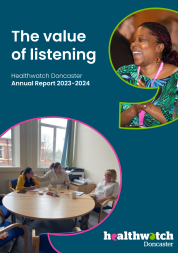Healthwatch Sheffield report into Disabled Access to Dental Services in South Yorkshire and Bassetlaw
Healthwatch Sheffield report investigating the experience of disabled people accessing dentists in South Yorkshire and Bassetlaw

It was based on questionnaires answered both by service users and dental care professionals. In addition to the findings and recommendations, this report also includes the official response from the service provider, in this case the Dental Local Professional Network.
Key findings:
- Half of the respondents were happy with the service they were currently receiving at their dentist although 57% reported a difficult or negative experience with the dentist I the past.
- Over a fifth (22%) of respondents had not visited the dentist for more than two years for a range of reasons including issues with getting there and accessibility of the building, anxieties over attending and procedures, cost of treatment and a lack of understanding of the importance of good dental health.
- A total of 85% of dental healthcare professionals reported that they could provide suitable treatment for wheelchair users if required, however, almost half stated that they would like further equipment.
- A number of service users mentioned that there were barriers in communication between them and the dental professionals.
Recommendations
- The report made seven recommendations including that all dental practices should aim to make their premises fully accessible where possible and that up-to-date information about accessible practices should be readily available.
- Recommended a number of other non-physical adjustments that practices should consider including giving people with disabilities longer appointments or having appointments at a time when there are fewer people around, taking extra time to explain things to patients and providing large print information.
- Recommended that dental practices follow up disabled people who do not attend regularly (and in particular people who have not attended for more than two years) to identify any physical or emotional barriers, and offer support where possible and that dental professionals increase their awareness and understanding of communication barriers during treatment.
Downloads
If you need these documents in a different format, please email [email protected] or call 0114 253 6688.
Full report
Summary report

